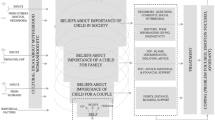Abstract
In this study, I examine women’s experiences with infertility and the impact upon their conceptualizations of ‘family.’ Active interviews with 32 women revealed most women started out with conceptualizations that reflected a traditional ideology of family. Participants who conceived biological children through medical assistance expressed a broader conceptualization of family through a greater appreciation for their children and family life in general. Women who did not conceive, despite medical assistance to do so, also discussed broadening their conceptualizations so that ‘family’ took on new meanings, structures, and/or significance. Conceptually, the analysis shows how notions of family are not static, but rather a fluid process subject to interpretation and re-evaluation as a result of life events, in this case, encounters with infertility.
Similar content being viewed by others
References
Allen, K. R., & Demo, D. H. (1995). The families of lesbians and gay men: A new frontier in family research. Journal of Marriage and the Family, 57, 111–127.
Aronson, D. E. (2000). Defining infertility. Public Health Reports, 115, 6.
Bartholet, E. (1999). Nobody’s children: Abuse and neglect, foster drift and the adoption alternative. Boston, MA: Beacon Press.
Bartholet, E. (1993). Family bonds: Adoption and the politics of parenting. Boston, MA: Houghton Mifflin Company.
Becker, G. (2000). The elusive embryo: How women and men approach new reproductive technologies. Berkley, CA: University of California Press.
Bella, L. (2002). Family making among migrants: Chain migrants and autonomous migrants use their leisure to build caring connections in a new community. Paper presented at the 10th Annual Canadian Conference on Leisure Research, University of Alberta, Edmonton, Alberta.
DeVault, M. L. (2000). Producing family time: Practices of leisure activity beyond the home. Qualitative Sociology, 23, 485–503.
Dupuis, S. (1998). Naked truths: Towards a reflexive methodology in leisure research. Leisure Sciences, 21, 43–64.
Fisher, B. (1992). Against the grain: Lives of women without children. IRIS: A Journal About Women, 2, 46–51.
Glaser, B. G., & Strauss, A. (1967). The discovery of grounded theory: Strategies for qualitative research. Chicago, IL: Aldine.
Greil, A. L. (1991). Not Yet Pregnant: Infertile Couples in Contemporary America. New Brunswick: Rutgers.
Greil, A. L., Leitko, T. A., & Porter, K. L. (1988). Infertility: His and hers. Gender and Society, 2, 172–199.
Harding, S. (1991). Whose Science? Whose Knowledge? Ithaca, NY: Cornell University Press.
Hequembourg, A. L, & Farrell, M. P. (1999). Lesbian motherhood: Negotiating marginal-mainstream identities. Gender and Society, 13, 540–557.
Horvath, K. A. (1999). Infertility treatment: An argument for mandated coverage. Journal of Health Law, 32, 445–469.
Jordon, C., & Revenson, T. A. (1999). Gender differences in coping with infertility: A meta-analysis. Journal of Behavioral Medicine, 22, 341–358.
Kashef, Z. (1998). Miracle babies. Essence, 28, 80–82.
Kaufman, B. J. (1992). Feminist facts: Interview strategies and political subjects in ethnography. Communication Theory, 2, 187–206.
Miall, C. E. (1996). The social construction of adoption: Clinical and community perspectives. Family Relations, 45, 309–317.
Nelson, M. K. (2000). Single mothers and social support: The commitment to, and retreat from, reciprocity. Qualitative Sociology, 23, 291–317.
Olesen, V. L. (2000). Feminisms and qualitative research at and into the millennium. In N. K. Denzin & Y. S. Lincoln (Eds.), Handbook of Qualitative Research (pp. 215–256). Thousand Oaks, CA: Sage.
Patton, M. Q. (1990). Qualitative evaluation and research methods (2{nd} Ed.). Thousand Oaks, CA: Sage.
Prus, R. (1996). Symbolic Interaction and Ethnographic Research: Intersubjectivity and the Study of Human Lived Experience. Albany, NY: State University Press.
Schwandt, T. (2001). Three epistemological stances for qualitative inquiry: Interpretivism, hermeneutics, and social constructionism. In N. K. Denzin & Y. S. Lincoln (Eds.), Handbook of Qualitative Research (pp. 189–214). Thousand Oaks, CA: Sage.
Shaw, S. M. (2001). The family leisure dilemma: Insights from research with Canadian families. World Leisure, 43, 53–62.
Springen, K., Scelfo, J., & Pierce, E. (2001, August). The truth about fertility: Why more doctors are warning that science can’t beat the biological clock. Newsweek, 40–48.
Thompson, L. (1992). Feminist methodology for family studies. Journal of Marriage and the Family, 54, 3–18
Ulrich, M., & Weatherall, A. (2000). Motherhood and infertility: Viewing motherhood through the lens of infertility. Feminism and Psychology, 10, 323–336.
Wolf, N. (2001). (Misconceptions). Truth, Lies, and the unexpected on the Journey of Motherhood. New York, NY: Doubleday.
Author information
Authors and Affiliations
Corresponding author
Rights and permissions
About this article
Cite this article
Parry, D.C. Women’s Experiences with Infertility: The Fluidity of Conceptualizations of ‘Family’. Qual Sociol 28, 275–291 (2005). https://doi.org/10.1007/s11133-005-6371-z
Issue Date:
DOI: https://doi.org/10.1007/s11133-005-6371-z




